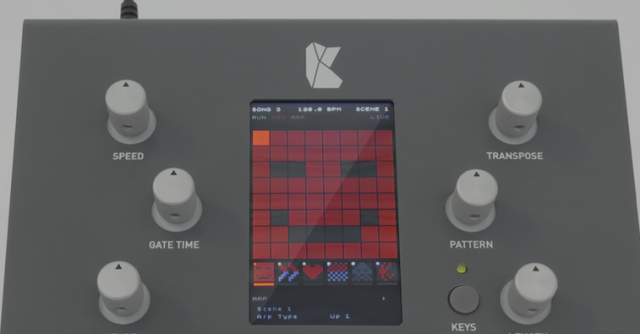
Kilpatrick Audio – creator of the Phenol synthesizer – has launched a crowdfunding campaign to produce the new Carbon Sequencer and Performance System.
Here’s the official promo for the campaign:
Carbon is primarily designed as a pattern-based sequencer. It has six tracks which can each hold 64 steps. Steps can be generated randomly, edited interactively, recorded from a MIDI keyboard one step at a time or in realtime while the sequencer is running.
Polyphony and CC recording is supported so each step can contain chords or other performance data.
The real power of Carbon is how variations of sequences can be made. By turning the Pattern control, different steps in the sequence can be enabled and disabled.
Adding in the concept of scenes lets you quickly switch between different parts of a song or different variations. Scenes can store the range of steps to play, the pattern, track mute state and a number of other parameters.
All the recording and editing can be done in real-time without ever stopping the sequencer.
Carbon is also a performance switching system, allowing you to easily send your keyboard signal to MIDI and analog instruments. Two built-in MIDI outputs enable separate routing of clock and channel signals from each track. The analog section supports four CV/gate outputs plus reset and clock signals. Both monophonic and duo/polyphonic output types are supported. You can even send to multiple MIDI and analog instruments at the same time.
Here are a set of demo videos for the Carbon sequencer:
Preliminary specs & features:
- Pattern-based sequencer, performance control system and USB interface
- Beautiful color LCD screen shows everything in real-time
- Six rotary encoders and nineteen buttons offer fast intuitive control
- Six tracks with two assignable outputs per track
- Up to 64 steps per track
- Polyphonic tracks store chords and CC data
- Playback start and end points are uniquely configurable for each track
- Pattern function offers quick remixes each track
- Multiple track select allows adjusting multiple tracks at the same time
- Flexible MIDI and CV routing allows huge control possibilities
- Bias tracks allow transposing of other tracks for oldschool sequencer tricks
- Six scenes offer fast parameter changes during live performance
- LIVE mode allows live performance from a keyboard
- Keyboard split and LIVE multi-select modes allow fast and flexible live MIDI routing
- Powerful synced arpeggiator adds another dimension to live performance
- Rock-solid MIDI / analog clock source can be the heartbeat of your studio
- Rear panel connections / controls:
- Analog clock and reset outputs (0V/+5V)
- Four CV outputs (-5V to +5V – 1V/octave digitally calibrated)
- Four gate outputs (0V/+5V)
- Two MIDI output ports (separately assignable)
- MIDI input port
- USB host port – provides up to 500mA to power USB controllers
- Get news and updatesUSB device port – connects to PC or Mac for use as a MIDI interface and controller
- Power switch
- DC input jack
- Power input: 24VDC @ 250mA (500mA regulated supply required)
- Operating temperature: 15C to 30C (59F to 86F)
- Storage temperature: -10C to 45C (14F to 113F)
- Dimensions: TBD
- Weight: TBD
- Universal input power supply (100-240V) included
- units purchased from North American dealers ship with a US-style plug
- units purchased from UK, EU and Australian dealers ship with a set of plugs for US, UK, EU and Australia
- Designed and made in Canada using high quality parts
- Warranty: 1 year
The Carbon is priced at US $699, with ‘early-bird’ backer pricing starting at $589. See the Kilpatrick Audio site for details.

is it me or does the display remind you of minecraft?
been regretting not getting in on the Phenol early-bird, but I don’t know about this one… that’s a funny lookin sequencer.
I’m waiting for the tear down video that shows its an ipod under the case.
Obviously trained fleas with little flashlights and jumper cables.
It’s one thing to pile on recorded phrases on the fly but it’s another to modify and remove existing note and performance data. This looks like a pain in the butt like most sequencers ever made.
Extraordinarily cool! I have Kilpatrick’s K4815 Pattern Generator for Eurorack and love it! This adds a lot of useful new features and should interface better with my entire setup. Preordering one was a no-brainer.
No clock input? Deal breaker for me…
I think a step by step of how it works is needed to fall in love with a high spec sequencer you want to know exactly how it works before you lay out the cash.
Its kinda interesting but Im not into sequencers and pattern based stuff that leans towards visual cues, or manipulation of visual symbols, heavily screen-based UIs, etc – because in my experience it tends to detract from the musicality of the output
but then again thats just my personal preference